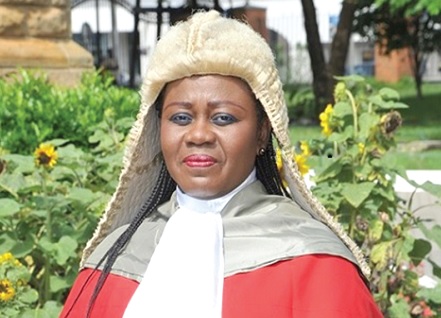
Democracy’s critical junctures - Removal of the Chief Justice
Ghana’s suspended Chief Justice has been removed from office upon the recommendation of the committee set up to investigate one of three petitions brought against her by a citizen.
The following infractions – a) unlawful expenditure of public funds; b) abuse of discretionary power; and c) interference in judicial appointments served as the basis for the committee’s decision in accordance with Article 146(1) of the constitution.
Imposing the highest form of sanction on the head of an independent constitutional body like the judiciary is no laughing matter especially because it is unprecedented in the Fourth Republic.
We stand at a critical juncture and how we deal with this will surely have implications for our democracies. Here are my three points of reflection.
Fixing the fault lines of Article 146
I share in the frustration of those dissatisfied with how the framers of the Constitution spelt out the dictates of this article.
For example, what constitutes “stated misbehaviour and misconduct” is vague and leaves a wide latitude for interpretation.
Mechanisms such as the role of the Council of State, the committee that reviews the petition, and the opportunity to present a defence are built into the process to guard against improper use. I still maintain that the country must take advantage of the current constitution review process to fix these fault lines.
First, provide, not an exhaustive, but an indicative list of infractions that can be described as constituting “stated misbehaviour and incompetence.”
I do not in any way suggest that a committee is incapable of arriving at a reasonable judgement about this, but the many public conversations suggest citizens will find such clarity helpful.
Second, there was a raging debate over the appropriateness of holding such proceedings in camera.
Those who designed the Constitution chose this path which has been reinforced by Supreme Court rulings.
However, it is worth asking whether this is the best approach to handling Article 146 proceedings.
Third, any proceedings triggered under Article 146 begin with a petition submitted to the President.
The Constitution gives the President no discretion of what to do when a petition is received.
If it is a justice of the superior court, the President must refer it to the Chief Justice.
If it is the Chief Justice, the president must refer it to the Council of State. I understand the institutional design of ensuring that coequal branches of government hold each other accountable.
However, I wonder whether the President should be taken out of the process and let the institution that approves a nominee (Parliament) have the responsibility to remove from office.
The prospect of a partisan process is real but perhaps setting a high threshold for removal (3/4ths majority) may help cure any political mischief that a redesign of the process may be used for.
Independence and accountability
Since the beginning of the proceedings, critics of the process have pointed to the independence of the judiciary and expressed fear that removing the Chief Justice is tantamount to an attack on an independent constitutional body.
Independent constitutional bodies are critical safeguards of any democracy and so is the separation of powers.
It therefore cannot become an accepted practice where it appears as though the removal process is weaponised to settle differences when coequal branches of government have disagreements.
Their concerns are valid.
What has been missing in their rhetoric, though, is another critically important good governance principle - accountability.
I believe that independence does not mean unaccountable, and it is precisely for this reason that the framers of our Constitution, in granting independence to certain institutions and their office holders, also provided mechanisms for how they can be sanctioned for any infractions committed during their work.
Valid concerns about the process should not veer into the territory of rejecting any form of accountability where it is warranted.
It also means that we must ensure the appropriate sanctions are imposed whenever there is a need for accountability.
The rhetoric of partisans
The acceptability or otherwise of the process and its outcomes by partisans of our two main political parties cannot be overlooked.
The polarised response is very noticeable.
The rhetoric of where aggrieved partisans promise to avenge what they perceive as an injustice in the event of turnover election is worrying.
Can our democracy survive a regular cycle of this anytime there is a turnover election? In my opinion, the fault lines of Article 146 should not be fixed through partisan threats but rather by constitutional reforms.
In the final analysis
We must cross this critical juncture in a way that does not weaken our institutions and democracy architecture.
Democracies remain resilient in how well they respond to major shocks like this to their system. Our choices from here on will dictate what happens next.
The writer is Project Director, Democracy Project
